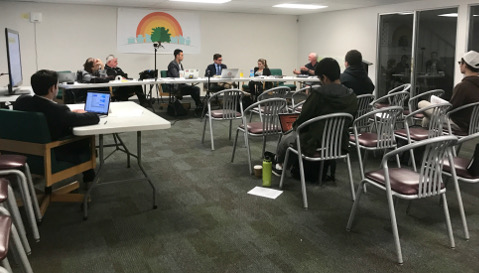New I.V. District Board Snarled in Procedure
Funding, Interns, and Structure Debated Toward Midnight

The Isla Vista Community Services District (IVCSD) caught itself in a web of politics at its third board meeting Tuesday night, as argumentative banter within the Board of Directors led to another five-plus-hour discussion that addressed, at times, insurance, current and future funding options, policies, internship program details, and structural concerns.
The meeting’s disarray is hardly unaligned from Isla Vista’s quirky character, reaffirming the community’s reputation for disorderly yet well-intentioned quarrel.
Since the governing body’s inaugural meeting, community representation has dwindled from overflow and out-the-doors to single-digit numbers. Nonetheless, members of the public rose to share ideas about the Community Services District and the community it represents. Among these included Kristen, UCIV program representative, who presented the UCSB Associated Students’ volunteer efforts to “bridge the gap between students and police,” especially in anticipation of Deltopia, planned for this weekend. She said student volunteers will be handing out water, snacks, and condoms on Del Playa during the event.
Jonathan Abboud, board director of the Isla Vista Community Development Corporation (IVCDC), presented a website he was creating for the district using Squarespace. The site includes board of director contact information, meeting agendas, minutes and videos, news, calendars, options for subscription, and links to donate to the department and get involved. The site can be viewed at www.islavistacsd.com.
Because the vote to establish a utility tax for the district just barely fell short of passing, the district is tasked with securing alternate sources of revenue. In addition to the $1.4 million pledged by UCSB and to be divided into $200,000 increments per year for seven years, the board discussed additional avenues for funding. The Community Development Corporation plans to raise money for the district as well, said Abboud. He proposed fundraising through Isla Vista alumni events, phone banking, voluntary tax to current Isla Vista residents, reaching out to “friends of the community,” and applying for grants, particularly from the Santa Barbara Foundation and the Neighborhood Funders Group. “Our goal is $40,000 in 2017,” Abboud said.
Spencer Brandt, secretary of the district’s board, saw benefit in this monetary relationship between the Development Corporation and district. “The huge advantage of working with the IVCDC is that there is already an infrastructure for fundraising in place,” he said.
Robert Geis, a boardmember appointed by the county, worried about a conflict of interest between the two platforms. He said there is a potential for “deal making” and that the board needs to “think about donor influence and create a policy about solicitation.”
Boardmember Jay Freeman expressed his observation of public concern regarding interactions between the Development Corporation and district. He said many community members he spoke with called the corporation a “highly political organization” and were wary of donating to the new Community Services District upon hearing of the corporation’s involvement.
Abboud refuted these comments. He argued that much of what Freeman heard was in reference to previous administration of the corporation and did not reflect the goals of current board members.
The board voted to task the Formation Committee with crafting an agreement regarding the relationship between the two entities.
Boardmember George Thurlow, a UCSB appointee, rescinded his involvement in the district’s internship program and excused himself from the meeting during its discussion. The district is currently working with Bruce Brimber, chair of UCSB’s Department of Political Science, to hire paid interns beginning spring quarter.
Ethan Bertrand, president of the board, celebrated that they received 45 applications for the program during the eight-day window. While three applicants will be employed by UCSB and chosen by the political science department, these interns will work in coordination with either Freeman, Bertrand, or Brandt, the board decided.
The board also voted to dissolve the Internship Committee and replace it with an ad hoc committee to develop a set of protocols for directors to work with assigned interns.
In efforts to consolidate meeting duration and efficiently discuss agenda items, board members disputed structural approaches to current and future meetings. The debacle lasted about an hour and a half.
The board frequently referenced the Ralph M. Brown Act, which details the public’s right to attend and participate in meetings by preventing board members from holding private meetings. Natalie Jordan, vice president of the board, emphasized the importance of rigid structure in the district’s meetings to thoroughly discuss items yet ensure compliance with the law. Thurlow also endorsed structure, commenting that their board is creating “a legacy” that will provide guidance for years of future board members, an idea that was affirmed by Boardmember Jon Hedges.
During discussion of structure surrounding agreements and contracts, the board downspiraled into a rigmarole of personal attacks and accusations. Freeman attached a letter to the meeting’s agenda intended to clarify his abstention from a vote to finalize a Memorandum of Understanding with the university establishing the Internship program. He wrote that he “saw the ‘evil eye’ that [he] was getting from most of the rest of the Board” during discussion of the agreement.
Jordan took issue with Freeman’s letter, unsure why Freeman called her out for “not showing up to two meetings,” she said. She argued “a board member’s voice comes through in their vote.”
During Jordan’s refutation, she apparently observed a certain gaze from Freeman. “Don’t make a face at me if we’re talking about evil eye, Jay,” she said.
Freeman commented that Thurlow blamed Jordan for some of the structural discrepancies. Bertrand asserted, “Thurlow did not blame anyone,” to which Freeman said Bertrand was “trying to put a parliamentary definition on the world ‘blame.’”
Ultimately, the board decided that the Policy Committee is responsible for handling structural issues.
At the next meeting, on April 18 at 6 p.m. in the Community Room at 970 Embarcadero Del Mar, the board’s discussion will include possible assignments of board members to report on Associated Students meetings, power activation, and proposals of how to address future agenda items.


